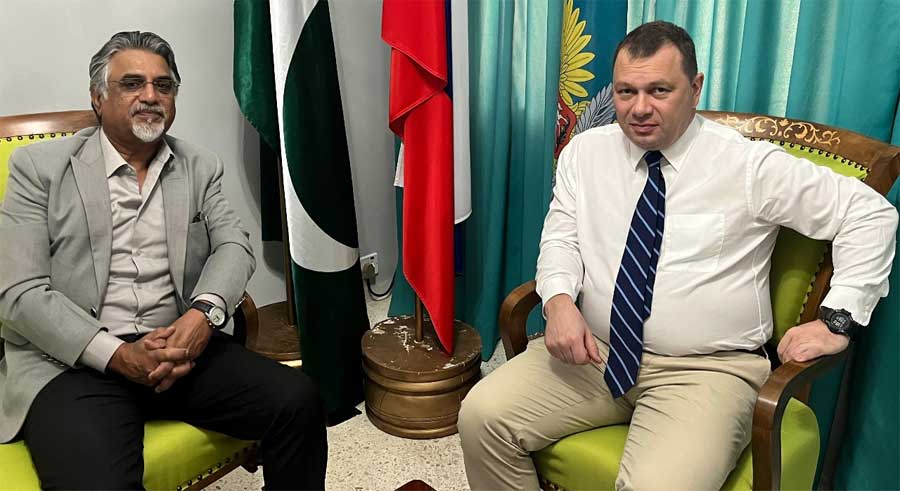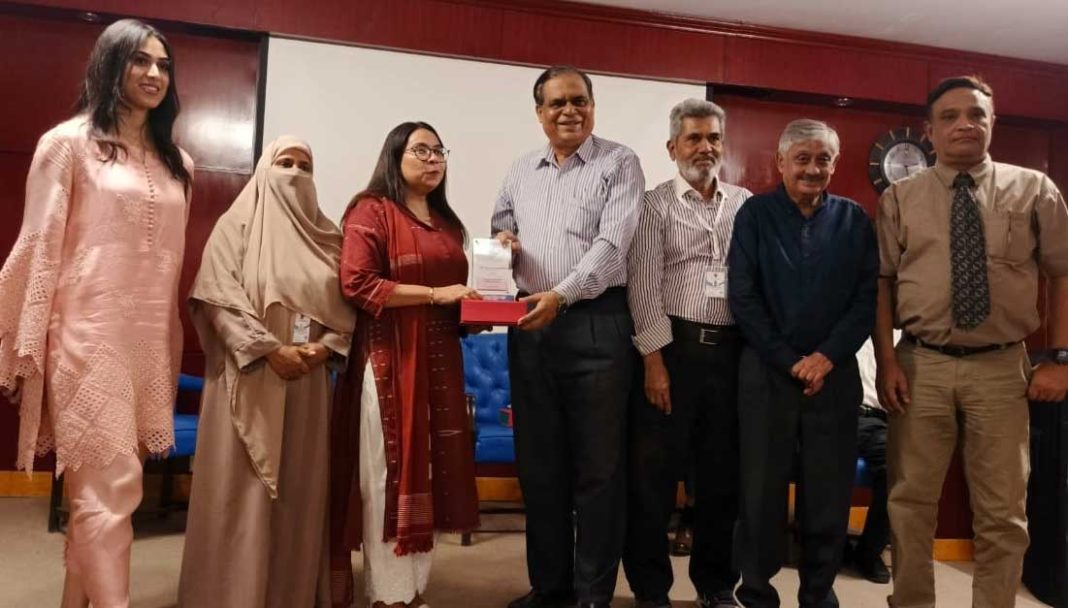Dr Muhammad Ali Ehsan
An interview of Andrey V Fedorov, the Consul General of the Russian Consulate of Russian Federation in Karachi was conducted by Dr Muhammad Ali Ehsan on 22 May 2025. He was asked about the ongoing war in Ukraine and if there were prospects of finding peace through negotiations.
Q. How does Russia view President Trump’s choice of so publicly taking Russia’s side?
A. Donald Trump has always been acting mostly in his own interests. However, the fact that the President of the United States is trying to understand the root causes of the crisis in Ukraine and is quite encouraging for us and contrasts with the Joe Biden administration, which pumped the Kiev regime full of lethal weapons and was proactive in its efforts to draw Ukraine into NATO. At the same time, President Donald Trump has said many times that there would be no conflict if the preceding administration did not seek to drag Ukraine into NATO. He is also interested in searching for a balance of interests and sincerely wants to listen to the Russian position. And our leadership understands the American position better as well through negotiations, meetings and discussions.
Q. How does Russia view American appeasement policy against its containment approach?
A. I would never call the approach of the current American administration neither appeasement nor containment. Especially due to the fact that the word “appeasement”, given its connotation, is used to wrongfully and criminally compare the current actions of Donald Trump with the policy of “appeasement” of Nazi Germany in 1930-s, which was conducted by the very same powers who nowadays make these outlandish analogies. Rather, I shall get back to my answer to the first question and reiterate that Moscow and Washington continue to maintain a dialogue to find a path towards a settlement, and we are glad that finally an American President recognized the need to address the root causes of this situation in Ukraine.
Q. Is the US banking on another reset with Russia?
A. Given the history of the previous “reset” announced by the former Secretary of State Hillary Clinton with a symbolic button in 2009, we should approach any discussions about another “reset” with great caution. Many times, we faced such situations when Western “partners” broke their promises and played tricks against us. Although Russia has always been ready and open to dialogue and strives to develop friendly relations with all countries, we should be wary of the possible repeat of such actions and take any discussions about “resets” with a grain of salt.
Q. Is West’s democratization effort consistent with Russia’s ambition to preserve its power?
A. This so-called “democratization effort”, as you will definitely agree with me, is a simple excuse to meddle into the domestic jurisdiction of the countries, who are “too sovereign” for the West and refuse to become their vassals. The same goes for Russia. One of the main reasons of Western anti-Russian drive in recent years has been the reemergence of our country as strong, united and economically-developed nation. They could not tolerate this new reality and started to play the same game against us. The culmination of this campaign was the attempt to create threats along our border by turning Ukraine into “anti-Russia”. Therefore, such confrontational approach had to be retaliated by launching special military operation for the denazification and demilitarization of Ukraine. West should keep in mind that Russia will always protect its sovereignty and national interests despite all their efforts to destabilize and disintegrate us in the name of “democracy”.
Q. Your comments on Russia’s growing strategic relationship with China
A. Strategic partnership between Russia and China has been the epitome of consistency and cooperativeness, and it continues growing amidst ongoing global turbulence. Russia and China enjoy a broad alignment of national interests, strong economic partnership and very fruitful regular interactions both bilaterally and on the multilateral platforms such as BRICS and SCO. Beijing also agrees with Russia that it necessary to eradicate the root causes of the Ukraine crisis in accordance with the corresponding principles of the UN Charter. And the official visit of President Xi Jinping to the Russian Federation to take part in the celebrations marking the 80th anniversary of the Great Victory on May 7-10 was another manifestation of the highest level of our relations.
Q. How does Russia view the post-Cold War order and the new order in the making?
A. After the end of Cold War, the West was inebriated by the idea of the “End of History” and tried to hijack the world order into unipolarity. This brief “unipolar moment” in international relations brought us such things as NATO bombing of Yugoslavia, wars in Iraq and Afghanistan, Western involvement in Libya, Syria, Egypt etc. It was one of the biggest challenges for the international stability, but thankfully it was also destined to transform into a more just multipolar world amid economic rise of the so-called “Global South”. Our President Vladimir Putin repeatedly said that the shift from the short-lived period of Western unipolarity to the multipolar world with many new centres of power in Asia, Africa, Middle East and Latin America has been inevitable and irreversible despite all the desperate attempts of Western countries to stop this process.
Q. How does Russia view the American/Western primacy in the post Soviet space?
A. Once again, their so-called “primacy” was extremely transitory. After the disintegration of the Soviet Union some of the newly formed nations looked up at West and tried to copy their political and economic systems, culture and way of life. However, people became very disenchanted with them due to their arrogance, disrespect and constant rug-pulling. Ukraine is a textbook example of why you should not rely on West too much. Just a reminder that it was former British Prime Minister Boris Johnson who convinced Ukrainians to stop Istanbul peace talks and continue fighting Russia on the battlefield which is why many nations and peoples are starting to understand that to be friends with the West is more dangerous than to be their enemies, and amid developing multipolarity we can conclude that the era of Western primacy in the post-Soviet space is finally over.
Q. Can the war in Ukraine end with negotiations?
A. Just like any other military conflict in history the special military operation in Ukraine will definitely conclude with an agreement. No matter how long and tough a clash is, both parties have to come to the negotiation table. The process is already happening in Istanbul, where the direct talks between Russia and Ukraine were recently resumed after a three-year break with the assistance of the President of the United States Donald Trump. But the key issue, according to our President Vladimir Putin, is to show firm commitment to peace and to forge a compromise that would be acceptable to all parties.
Q. How does Russia view the post-Cold War order and the new order in the making?
A. After the end of Cold War, the West was inebriated by the idea of the “End of History” and tried to hijack the world order into unipolarity. This brief “unipolar moment” in international relations brought us such things as NATO bombing of Yugoslavia, wars in Iraq and Afghanistan, Western involvement in Libya, Syria, Egypt etc. It was one of the biggest challenges for the international stability, but thankfully it was also destined to transform into a more just multipolar world amid economic rise of the so-called “Global South”. Our President Vladimir Putin repeatedly said that the shift from the short-lived period of Western unipolarity to the multipolar world with many new centres of power in Asia, Africa, Middle East and Latin America has been inevitable and irreversible despite all the desperate attempts of Western countries to stop this process.
Q. How does Russia view the American/Western primacy in the post Soviet space?
A. Once again, their so-called “primacy” was extremely transitory. After the disintegration of the Soviet Union some of the newly formed nations looked up at West and tried to copy their political and economic systems, culture and way of life. However, people became very disenchanted with them due to their arrogance, disrespect and constant rug-pulling. Ukraine is a textbook example of why you should not rely on West too much. Just a reminder that it was former British Prime Minister Boris Johnson who convinced Ukrainians to stop Istanbul peace talks and continue fighting Russia on the battlefield which is why many nations and peoples are starting to understand that to be friends with the West is more dangerous than to be their enemies, and amid developing multipolarity we can conclude that the era of Western primacy in the post-Soviet space is finally over.
Q. Can the war in Ukraine end with negotiations?
A. Just like any other military conflict in history the special military operation in Ukraine will definitely conclude with an agreement. No matter how long and tough a clash is, both parties have to come to the negotiation table. The process is already happening in Istanbul, where the direct talks between Russia and Ukraine were recently resumed after a three-year break with the assistance of the President of the United States Donald Trump. But the key issue, according to our President Vladimir Putin, is to show firm commitment to peace and to forge a compromise that would be acceptable to all parties.




